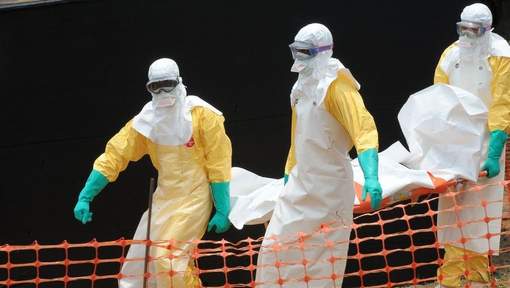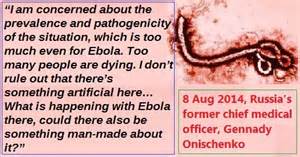Separating Facts about Ebola from the Fear Mongering About a Possible Pandemic
Let’s look at a few facts about Ebola, to determine whether there really is a danger of a global pandemic, or whether once again the American people are being steered by the mainstream media.

What the CDC, Center for Disease Control Says About Ebola
Ebola, an airborne virus of the family Filoviridae, genus Ebolavirus, is believed to be transmitted initially from bats. First appearing in the Democratic Republic of the Congo in 1974, this hemorrhagic fever has since appeared in several sporadic outbreaks on the African continent.
Facts about Ebola: Transmission
- It spreads through direct contact with body fluids, such as: blood, urine, feces, saliva, vomit and semen, when they come in contact with broken skin or mucous membranes.
- It can be spread by contaminated objects like syringes and needles.
- Infected animals can transmit the disease, by direct contact or when handling the bushmeat of an infected animal.
- It is not spread by water, air or food.
- Those at highest risk of contracting the disease are healthcare workers, and family and friends of an infected person if they come in contact with the body fluids.
- Without proper protective equipment like gowns, masks, gloves and eye protection, Ebola can spread rapidly in hospitals or healthcare clinics.
Facts about Ebola: Symptoms
Symptoms can take from two to 21 days to appear after initial exposure to Ebola; however, the average time is 8 to 10 days.
Symptoms include:
- Severe headache
- Fever of 101.5°F or higher
- Weakness
- Muscle pain
- Vomiting
- Diarrhea
- Severe abdominal pain
- Unexplained hemorrhage (bruising or bleeding)
Those with a healthy immune system are most likely to survive and will have developed antibodies that will keep them safe for the next 10 years.
Ebola: Prevention
Based on the method of transmission, the prevention is primarily about not coming into contact with the bodily fluids of someone sick with Ebola. If you must be around someone with Ebola, or who is suspected of having been exposed to Ebola, then make sure you use proper equipment.
Facts about Ebola: How Likely is it to See an Outbreak Outside of Africa?
All outbreaks of Ebola have occurred in Africa, and short of some traveler, exposed while in Africa and then traveling by plane outside of Africa; chances are pretty slim that you’ll be exposed to Ebola while living in Small Town, USA. So you’re probably safe.
Or are you?
Ebola: Weaponized Hemorrhagic Viruses

Based on the fact that Russia, and probably other governments, stockpiled hemorrhagic fevers during the Cold War, Anthony Fauci, director of the National Institute of Allergy and Infectious Diseases told a Senate hearing recently, “Theoretically, you can manipulate almost any virus to change it in any way you want.”
He also warned lawmakers that while Ebola is only transmitted through direct contact with bodily fluids, it wouldn’t take much for it to mutate to being airborne.
However, the idea of someone, with the idea of deliberately getting infected and then coming to the US in the hopes of causing a massive outbreak…a story making the rounds of some survival sites…so highly unlikely as to be nothing more than fear mongering.
Compare Death Rates
To put the threat of an Ebola pandemic into perspective, let’s look at the mortality rates of a few modern disease threats:
- Ebola - Current number of deaths in 2014 ranging from 1500 to 2300 (depending on who is doing the reporting).
- Influenza – Worldwide, 3 million to 5 million contract the influenza virus each year, with up to 500,000 deaths each year, with an average of 3,000 to 49,000 deaths due to influenza occurring in the USA.
- Mosquito-borne viruses such as West Nile, dengue, and yellow fever kill more than 50,000 people worldwide every year.
The facts about Ebola are, unless you are planning on traveling to Africa and visiting a hospital or clinic where Ebola patients are being cared for, then you are probably not in any danger from Ebola. Just keep your mosquito repellent handy and consider stocking up on a few N95 face masks for the next flu outbreak.
Return from Facts About Ebola to Survival Medicine





New! Comments
Have your say about what you just read! Leave me a comment in the box below.